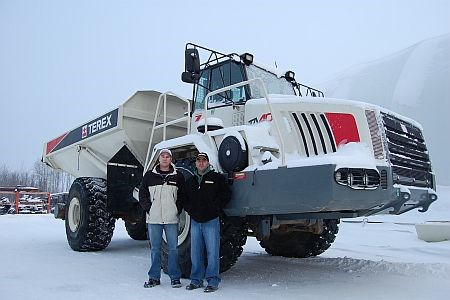The province’s new focus on enhancing business access to wood and biomass is keeping one Timmins heavy equipment sales and service firm hopeful it may provide a financial shot in the arm to the industry.
The province’s new focus on enhancing business access to wood and biomass is keeping one Timmins heavy equipment sales and service firm hopeful it may provide a financial shot in the arm to the industry.
Officials with ReadyQuip say that although business has been good through construction, mining and hydroelectric work occurring in the northeast, the revival of some forestry-related work could benefit suppliers.
“Unfortunately, the industry hasn’t been there to support it in the last several years, so the volume (of forestry equipment sales) has diminished quite substantially,” says Mike Larose, sales and marketing manager of ReadyQuip, and son of president Guy Larose.
“But we’re confident it will come back.”
Founded in 1986, ReadyQuip currently employs 15 people year-round at its Timmins location, where it sells a wide variety of equipment, including excavators, loaders, crushers, generators and customized equipment for mining and exploration firms. It also features a parts and service facility, complete with service trucks, crane and waste disposal system.
Although forestry once made up 70 per cent of its business, the company has had to diversify over the years to avoid falling to the same fate as the industry it served. Forestry now makes up no more than 20 per cent of its business, with the remaining 80 per cent consisting mainly of construction and mining.
With the Ontario government looking at opening new wood allocation and biomass opportunities to businesses, Larose says he’s optimistic about what it could mean for the company’s forestry line of products. Available largely through Finland-based Ponsse, ReadyQuip already has a number of units on hand and available, from chippers to forwarders armed with claws to collect slash piles or brush.
Still, the length of the government process is taking “longer than any of us would have liked,” and the financial markets are not cooperating. Financing agencies have put a “black mark” against any forestry-related projects, says Larose, and simply won’t consider approving any loan or purchase.
As such, it’s up to the government to relieve the pressure by encouraging financial institutions to loosen the purse strings for this kind of work.
“This biomass can take off as much as it wants, but the equipment is expensive, and there’s not much used out there, so a lot of people will have to go new, and the financing isn’t there,” says Larose. “It’s not everybody that can turn around and invest $1 million into a system to produce biomass, and there’s going to be need for some government support there. Otherwise, it’s going to be very limited.”
Still, ReadyQuip has plans in place to bring about their own forestry-related successes.
Partnerships have already been struck with various First Nations communities for hydroelectric and mining projects, and the company is looking at expanding that strategy into forestry. By helping to provide training to use more advanced and more efficient equipment in forestry projects, the company can help First Nations reduce their costs.
As an example, Larose points to the company’s dealings with the Nipissing First Nation, which first knocked on ReadyQuip’s door in search of harvesting equipment for use at its proposed wood pellet manufacturing plant.
In order to minimize ground disturbance and maximize environmental safety, however, qualified operators are needed. As such, plans are being put in place to jointly develop a system involving a mix of in-class training and time in a special simulator designed to ease the learning curve associated with using Ponsse equipment.
This portable simulation trailer is armed with a screen and special controls allowing the user to adjust their learning to different types of trees, be it hardwood or softwood, and terrain.
Reaching out to First Nations communities for projects and training is a “first step,” but an important one.
“There’s definitely a lot of advantages for them to go this route,” says Larose.
www.readyquip.com
